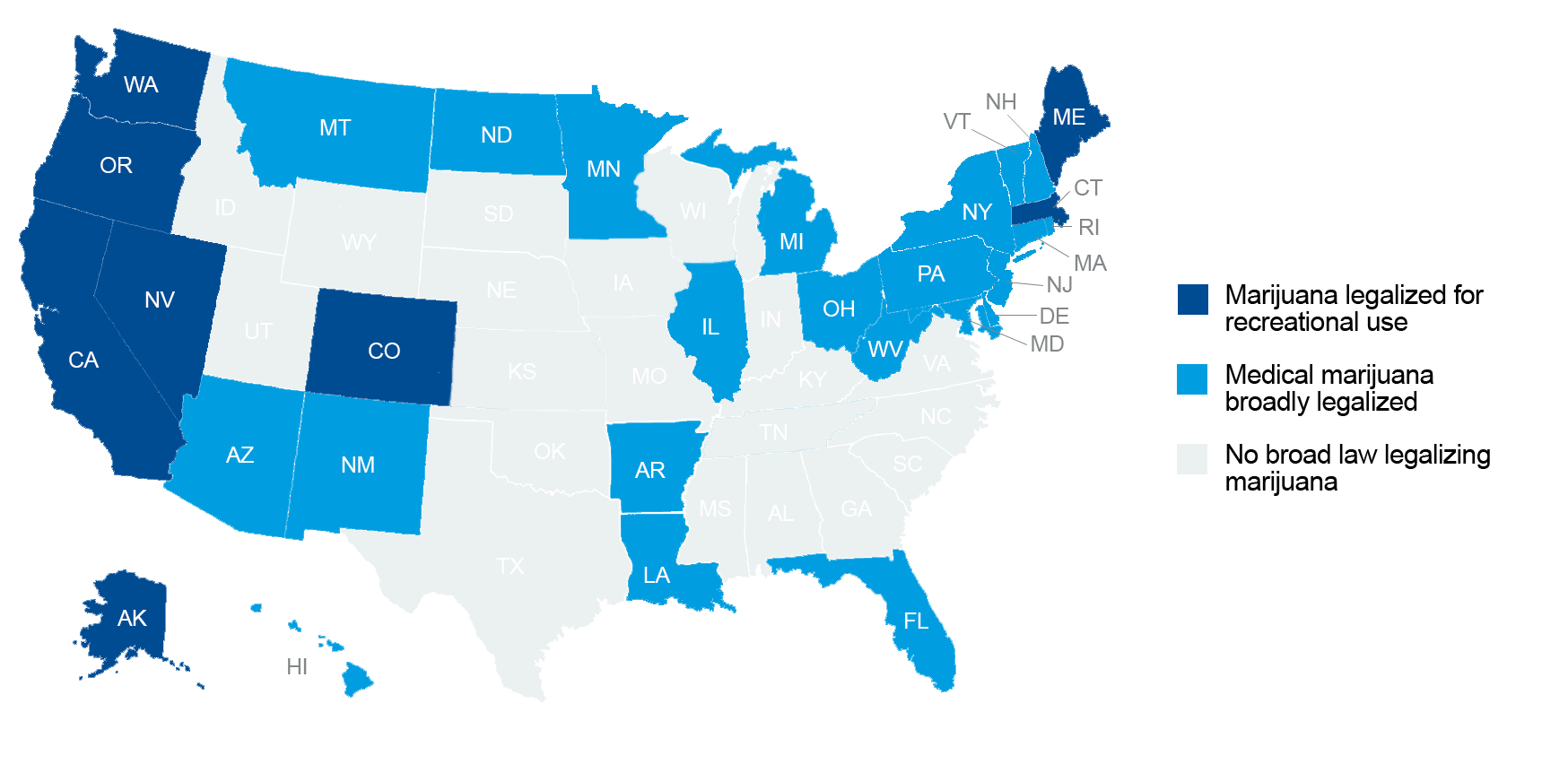The 2016 election was memorable for many reasons, but lost in the shadow of the presidential outcome was the big night marijuana legislation had in the states. Three states (Arkansas, Florida, and North Dakota) passed initiatives legalizing medicinal marijuana, marking the first time that more than half of the states have permitted the use of medicinal marijuana. Voters in Montana rolled back some restrictions on their existing medical marijuana law. Meanwhile, California, Maine, Massachusetts, and Nevada all passed legislation to allow for recreational marijuana use. The only loss for marijuana at the voting booth in 2016 was in Arizona, where voters rejected Proposition 205, which would have legalized recreational use of marijuana by adults 21 and older (medicinal marijuana laws passed in Arizona in 2010). In the aftermath of the election, the entire West Coast now permits some type of marijuana use and recreational use gained a foothold in the Northeast. One in five people in the United States now live in a state where marijuana is legal.
While this could be seen as a victory for proponents of such measures, it may be setting states up for a showdown with the federal government.
Although the majority of states have relaxed regulations of marijuana use and public support for marijuana legalization is at an all-time high, the federal government classifies marijuana as a Schedule I substance under the Controlled Substances Act — the same classification as heroin. Regardless of the legislation of individual states, marijuana is still illegal under federal law. The Obama administration took a mostly hands-off approach to the actual enforcement of federal law; in 2009 then-Deputy Attorney General David Ogden wrote a memo to U.S. attorneys indicating that prosecuting those who are “in clear and unambiguous compliance with existing state laws providing for the medical use of marijuana” were not going to be a priority. After the passage of legislation in Colorado and Washington allowing for recreational marijuana usage in 2012, then-Deputy Attorney General James Cole issued a subsequent memo to U.S. attorneys, reiterating that “in jurisdictions that have enacted laws legalizing marijuana in some form and that have also implemented strong and effective regulatory and enforcement systems,” enforcement of federal law related to marijuana would not be a priority.

But even looking the other way on enforcement of possession in these states, the tension between federal and state law on the legality of marijuana manifests in banking, business, and other federal regulations. Federal banking laws prohibit marijuana dispensaries from conducting money transfers through credit card companies or debit networks, and revenues from marijuana sales cannot be stored in Federal Deposit Insurance Corporation (FDIC) insured banks. Marijuana businesses are also prohibited from deducting business expenses for federal tax purposes. Marijuana’s designation as a Schedule I drug has also impeded running clinical trials to determine potential medical benefits and risks. Members of the Oregon Congressional delegation recently introduced The Path to Marijuana Reform, a package of bills to “pave the way for responsible federal regulation of the legal marijuana industry, and provide certainty for state-legal marijuana businesses which operate in nearly every state in the U.S.”
During the presidential campaign, candidate Trump indicated that marijuana usage was an issue best left to the states, but Trump administration officials have given indications that they intend to rigorously enforce federal laws. In a February 23, 2017, press conference, White House Press Secretary Sean Spicer told reporters:
Attorney General Jeff Sessions has been an opponent of marijuana legalization in the past and hinted at a potential Department of Justice crackdown with comments made at the annual winter meeting of the National Association of Attorneys General. “We have a responsibility to use our best judgment … and my view is we don’t need to be legalizing marijuana.… I’m dubious about marijuana. I’m not sure we’re going to be a better, healthier nation if we have marijuana sold at every corner grocery store.” On April 5, 2017, Sessions sent a memo to U.S. attorneys indicating that he had established a Task Force on Crime Reduction and Public Safety and that one of the charges of the Task Force’s subcommittees is to “undertake a review of existing policies in the areas of charging, sentencing, and marijuana to ensure consistency with the Department’s overall strategy on reducing violent crime and with Administration goals and priorities.”
Resources, rather than rhetoric, may ultimately decide if the Trump administration follows the lead of the 2013 Cole memo or is more aggressive in enforcement. Sessions has recently acknowledged as much; despite his personal dislike for marijuana and skepticism of its benefits, he admitted that the Department of Justice doesn’t have the capacity to come in to a state and do the work of local law enforcement. Marijuana is also big business, which may be persuasive to the current administration. A new report by New Frontier Data has found that states with legalized marijuana are on track to generate $559 million from cannabis taxes in 2017. With that much money on the table, it is unlikely that states are going to back down quickly and quietly if the federal government increases enforcement. How this potential showdown over marijuana policy plays out will be illustrative of the current status of the ongoing interplay between federal and state authority and provide potential clues as to federalism under Trump.
Heather Trela is chief of staff and a fellow at the Rockefeller Institute of Government

